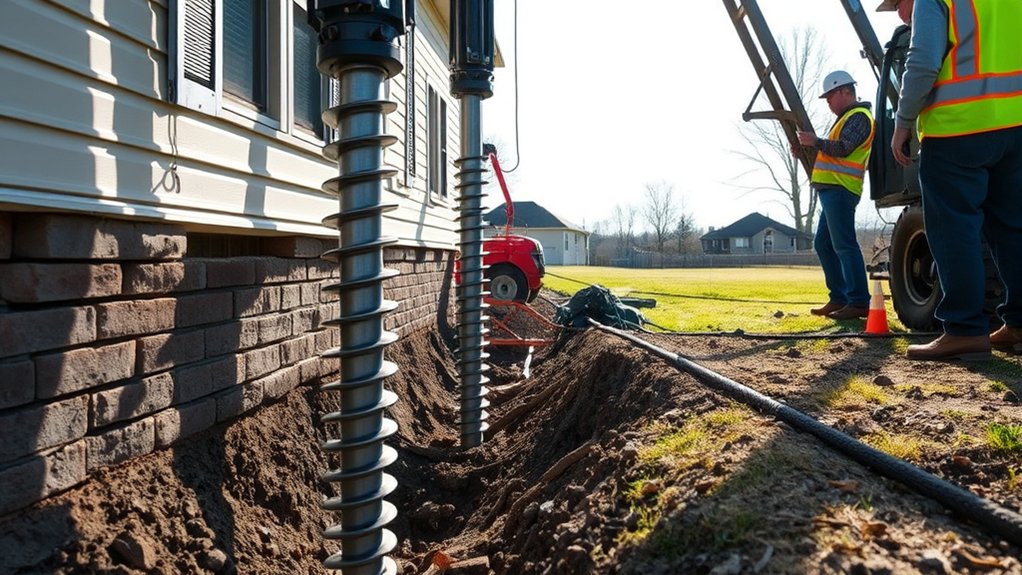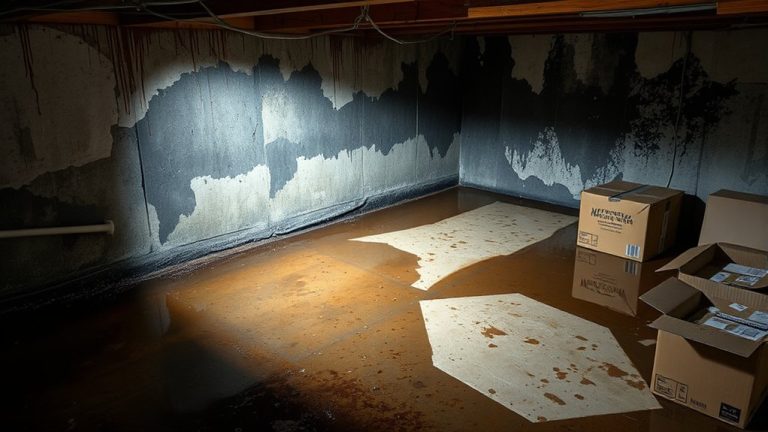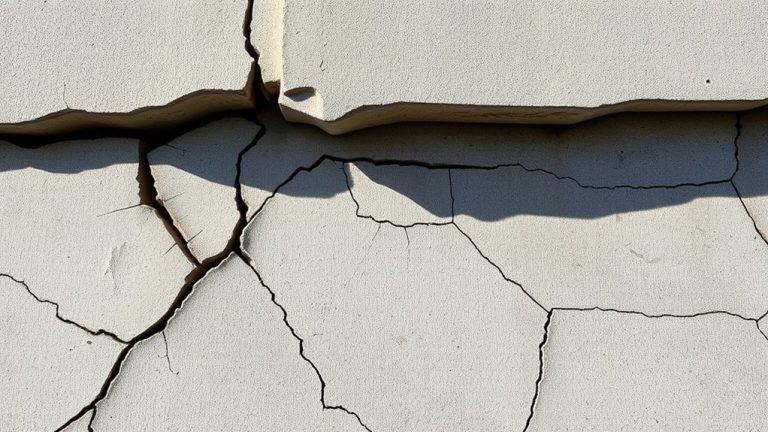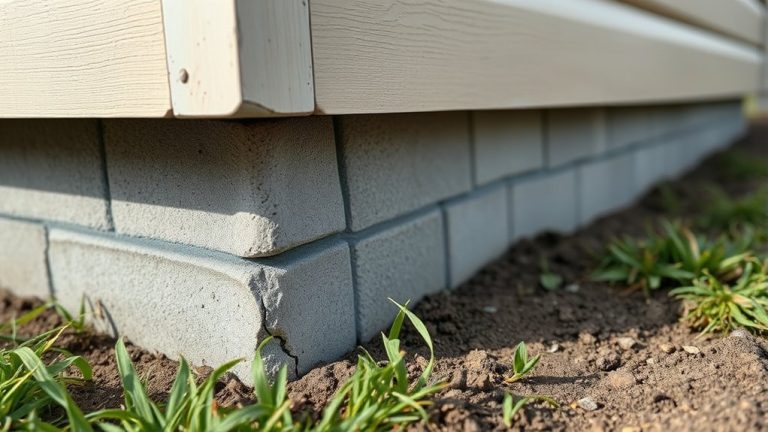Your home's foundation is its silent guardian, bearing the weight of your entire structure while constantly battling soil shifts and environmental stress. When small cracks appear or floors start feeling uneven, you'll want to pay attention—these could be early warning signs of potential structural compromise. Foundation issues don't just appear overnight; they're the result of gradual changes that, if left unchecked, can lead to significant and costly damage. Are you ready to understand what's happening beneath your feet and how to protect your most prized possession?
Key Takeaways
- Foundation damage can compromise structural integrity, with signs like uneven floors, wall cracks, and doors that won't close properly.
- Soil conditions significantly impact foundation stability, with factors like moisture levels, soil composition, and chemical properties affecting structural health.
- Professional assessment using advanced diagnostic techniques is crucial to identify root causes and recommend targeted foundation repair solutions.
- Repair methods vary depending on specific structural challenges, including slab jacking, pier and beam reinforcement, and carbon fiber strip installations.
- Early detection and intervention of foundation issues can prevent extensive damage and protect long-term home investment and structural safety.
Understanding Foundation Damage Types
Foundation damage can strike when you least expect it, turning your peaceful home into a source of stress and uncertainty. Understanding foundation failure modes helps you protect your home's structural integrity. Commercial and residential foundations require expert repair techniques to address structural challenges effectively.
Cracks, settling, and water damage are common issues that can compromise your foundation's stability. You'll want to watch for signs like uneven floors, wall cracks, or doors that won't close properly. These symptoms often indicate underlying structural problems that need immediate attention.
Common Signs of Structural Compromise
When structural issues begin to emerge, they'll often whisper before they shout, revealing themselves through subtle yet critical warning signs that homeowners shouldn't ignore. Settlement indicators like uneven floors, wall cracks, and doors that stick can signal deeper foundation problems. You'll want to pay close attention to these visible cracks, especially those wider than a hairline or running diagonally across walls. Foundation inspections can provide expert assessment of potential structural risks before they escalate into more serious issues.
Chimney tilting, basement water seepage, and gaps around window frames are additional red flags you should monitor. Don't wait until minor warning signs become major structural threats.
Soil Conditions and Their Impact on Foundations
Because soil plays a critical role in your home's structural integrity, understanding its composition and behavior is essential for preventing foundation damage. Different soil types react uniquely to moisture and environmental changes, potentially causing significant stress on your foundation.
Soil moisture levels can dramatically affect ground stability, with clay soils expanding when wet and contracting when dry. Soil chemistry impact also influences foundation health, as acidic or alkaline conditions can weaken concrete and accelerate structural deterioration. Monitoring these factors helps you proactively protect your home's foundation from potential structural compromise.
Professional Assessment and Diagnostic Techniques
If structural concerns are burdening your mind, professional foundation assessment offers the most reliable path to understanding your home's condition. Experts use advanced imaging techniques and extensive structural inspections to diagnose potential foundation issues accurately.
You'll benefit from detailed visual examinations, precise measurements, and state-of-the-art technology that reveals hidden problems. Trained professionals will evaluate soil conditions, detect stress points, and recommend targeted solutions. They'll help you understand the root causes of foundation damage, providing peace of mind and preventing costly future repairs.
Your home's stability is their priority.
Repair Methods for Different Foundation Issues
Since foundation problems vary widely, homeowners need targeted repair strategies that address specific structural challenges.
You'll want to understand methods like slab jacking and mudjacking techniques, which can lift and stabilize sunken concrete surfaces effectively. Different issues require unique approaches – from pier and beam reinforcement to carbon fiber strip installations.
Professional contractors can help you evaluate which repair method matches your home's specific foundation damage. Whether you're dealing with settling, cracking, or erosion, there's a strategic solution that can restore your foundation's integrity and protect your biggest investment.
Preventative Maintenance Strategies
When it comes to foundation health, proactive maintenance can save homeowners thousands in potential repair costs. By implementing seasonal inspections, you'll catch minor issues before they become major problems.
You'll want to monitor your foundation's condition regularly, checking for subtle signs of stress like hairline cracks, uneven floors, or slight wall separations. Don't ignore drainage around your home, as water can greatly impact foundation stability. Clean gutters, guarantee proper slope away from your foundation, and address any landscaping that might direct moisture toward your home's base.
Your diligence today prevents costly repairs tomorrow.
Cost Considerations and Budgeting
Foundation repair costs can quickly spiral out of control if homeowners don't plan ahead and budget strategically. You'll want to get multiple professional cost estimations and investigate various financing options to manage expenses effectively.
Consider setting aside an emergency fund specifically for potential foundation issues, which can save you significant stress and money. Research local contractors, compare their pricing structures, and ask about payment plans.
Remember that investing in preventative maintenance now can help you avoid more expensive repairs later. Your proactive approach can make a substantial difference in managing foundation repair costs.
Selecting the Right Foundation Repair Contractor
How do you guarantee your home's foundation gets the expert care it deserves? Start by thoroughly vetting potential contractors, focusing on their contractor qualifications and proven track record. Look for professionals with specialized foundation repair experience, proper licensing, and comprehensive insurance coverage.
Don't hesitate to request references and verify their warranty coverage before signing any agreements. Check online reviews, ask for detailed written estimates, and compare multiple contractors' proposals. Your foundation's stability depends on selecting a skilled, trustworthy professional who understands the unique challenges of your home's structural needs.
Frequently Asked Questions
Can Foundation Problems Affect My Home's Resale Value?
Yes, foundation problems can drastically impact your home's resale value. Get a professional home value assessment and follow foundation inspection recommendations to protect your property's marketability and worth.
How Long Does a Typical Foundation Repair Take to Complete?
You'll typically complete foundation repairs in 1-3 days after soil testing, though complex projects might extend to 1-2 weeks. Your project timeline depends on damage severity and repair method chosen.
Will My Homeowner's Insurance Cover Foundation Damage Repairs?
Your homeowner's insurance typically won't cover foundation damage caused by normal wear, settling, or poor maintenance. You'll need to identify signs of issues early and understand specific policy exclusions to determine potential coverage.
Are Foundation Repairs Permanent or Will Issues Potentially Return?
Foundation repairs aren't always permanent. You'll want to address underlying settling concerns to guarantee long-term structural stability. Proper techniques and professional intervention can minimize future issues and safeguard your home's integrity.
Can I Stay in My Home During Foundation Repair Work?
You'll likely experience altered daily routines during repairs, but most homeowners can stay put. Temporary displacement might occur for complex projects, depending on the extent of stabilization work required.



